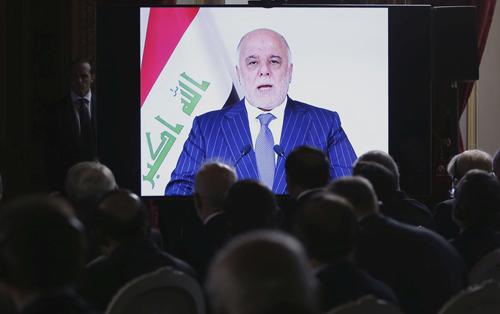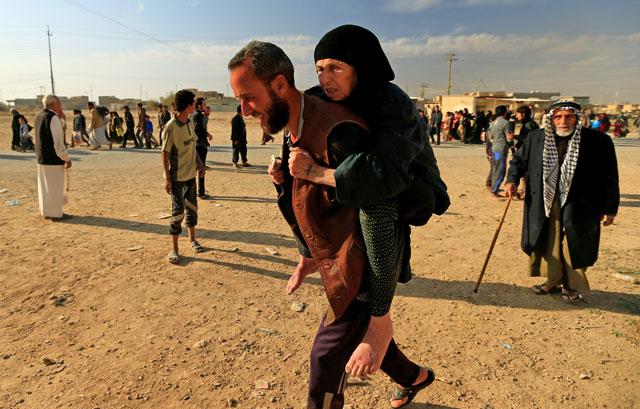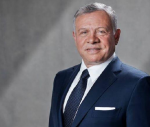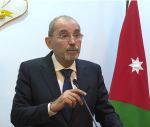You are here
Spotlight turns to US forces’ role as Daesh fight continues
By AFP - Dec 10,2016 - Last updated at Dec 10,2016
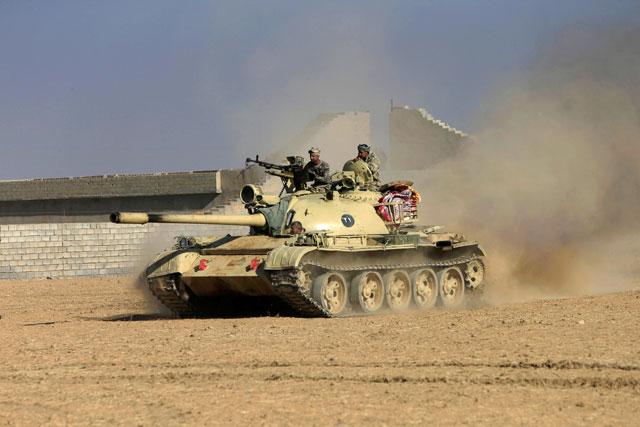
Members of the Iraqi Army ride in a tank during clashes with the Daesh terror group militants, south of Mosul, Iraq, on Saturday (Reuters photo)
WASHINGTON — As President Barack Obama prepares to leave office and step down as commander-in-chief of America’s military, a flap has erupted over the secretive commandos who have become his go-to counterterrorist force across the globe.
Obama’s foreign military policy has centred on the targeted killings of terror suspects — usually by drone strikes — and he has ordered such actions in countries including Iraq, Syria, Somalia, Yemen and Libya.
But when it comes to ground action, the president has steered away from large-scale troop deployments and favoured the light footprint offered by America’s hush-hush Special Operations Command (SOCOM).
The current kerfuffle stems from a Washington Post story that said SOCOM, specifically its super-secret wing called the Joint Special Operations Command (JSOC), is being granted new powers to track and potentially attack terror cells around the world.
The post said JSOC could in some cases even operate unilaterally, without having to go through the regular US military command structure responsible for operations across particular parts of the world.
The reported move ruffled feathers in other military units and among government agencies such as the CIA that also track foreign extremists.
They worried JSOC was being granted too much authority.
It “has caused for some friction in [the] government,” a senior military official said, speaking on condition of anonymity.
So this week, senior Pentagon officials moved to tamp down the story, saying SOCOM was not getting new powers, and that it would continue to operate within the long-established command structures.
Though secretive by trade, SOCOM has gained wide celebrity in America thanks to the countless books and movies depicting raids by its various teams.
This has long been a source of resentment for other military units, which sometimes feel overlooked when it comes to getting credit for America’s counterterrorism efforts.
Perhaps the most famous raid involving SOCOM fighters was the May 2011 assault by Navy SEALs that killed Osama Bin Laden in Pakistan.
New intel-sharing centre
Though the Pentagon disputed parts of the post story, the brouhaha did highlight the increased reliance America has placed on commandos fighting the Daesh terror group.
Defence Secretary Ashton Carter in October said he had put JSOC “in the lead” of countering Daesh efforts to carry out external attacks.
“We have already achieved very significant results both in reducing the flow of foreign fighters and removing ISIL leaders from the battlefield,” he told reporters, using a Daesh acronym.
The US-led coalition is closing in on its long-stated goal of booting Daesh militants from Iraq and Syria, with Iraq’s second city Mosul now under attack and an assault on Raqqa in Syria expected soon.
Much of this progress has been made possible by relentless coalition air strikes, but special operations forces have played a key role in both countries.
In Syria, about 250 US commandos have been training and arming local rebels and Kurdish fighters as they battle Daesh.
And special forces fighters are also working in Iraq, where alongside regular US troops they have been training the Kurdish peshmerga and Iraqi security forces.
SOCOM will likely play some sort of a role in both Raqqa and Mosul.
“The discussions of life after Mosul, life after Raqqa are happening in earnest right now — but arguably a bit late,” the official said.
The Daily Beast recently reported US special ops commanders are launching a new “counterterrorist nerve centre” in the Middle East that also will host agents from other US intelligence agencies like the FBI and CIA.
The senior official did not confirm the story but said: “We are building our most coherent process and infrastructure possible, forward at an unspecified location.”
The official also highlighted the potential dangers special operations troops face in Syria.
The US commandos have been working with local Kurds, much to the fury of key NATO ally Turkey, which sees the Kurdish YPG forces as a terrorist offshoot of the Kurdistan Workers Party (PKK) that has been waging an insurgency inside Turkey since 1984.
Turkey has on multiple occasions attacked the Kurdish fighters.
“Every day, that drives the Turks nuts that we are riding [with] a 15,000 — 20,000 person primarily Kurdish force that they consider to be the PKK and their mortal enemies,” the official said.
Related Articles
BAGHDAD — US Defence Secretary Ash Carter’s push for Iraq to let Turkey play a role in the battle to retake Mosul from the Daesh terror grou
BEIRUT — Kurdish-Arab fighters aided by American soldiers battled the Daesh terror group north of its Syrian stronghold of Raqqa Thursday as
BAGHDAD — Iraqi special forces inched their way through districts of east Mosul on Sunday, clearing pockets of Daesh militants they said wer


